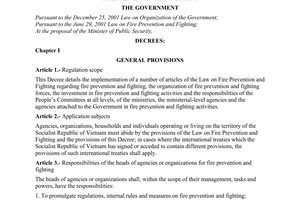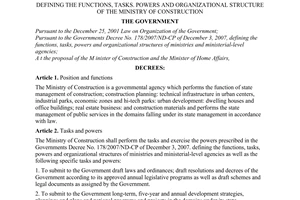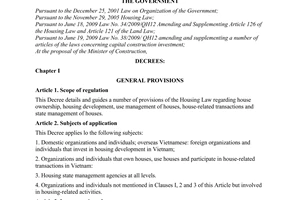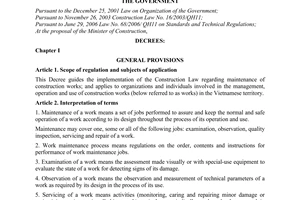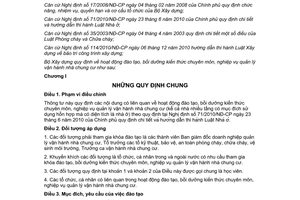Circular No. 14/2011/TT-BXD providing for professional training in condominium đã được thay thế bởi Circular No. 10/2015/TT-BXD professional training courses in management of apartment buildings và được áp dụng kể từ ngày 15/02/2016.
Nội dung toàn văn Circular No. 14/2011/TT-BXD providing for professional training in condominium
|
THE
MINISTRY OF CONSTRUCTION |
SOCIALIST
REPUBLIC OF VIET NAM |
|
No. 14/2011/TT-BXD |
Hanoi, November 25, 2011 |
CIRCULAR
PROVIDING FOR PROFESSIONAL TRAINING IN CONDOMINIUM OPERATION MANAGEMENT KNOWLEDGE AND SKILLS
Pursuant to the Government's Decree No. 17/2008/ND-CP of February 4, 2008, defining the functions, tasks, powers and organizational structure of the Ministry of Construction;
Pursuant to the Government's Decree No. 71/2010/ND-CP of June 23, 2010, detailing and guiding the implementation of the Housing Law;
Pursuant to the Government's Decree No. 35/2003 of April 4, 2003, detailing a number of articles of the Law on Fire Prevention and Fighting;
Pursuant to the Government's Decree No. 114/2010/ND-CP of December 12, 2010, guiding the implementation of the Construction Law, regarding the maintenance of constructions works;
The Ministry of Construction provides for training in condominium operation management knowledge and skills as follows:
Chapter I
GENERAL PROVISIONS
Article 1. Scope of regulation
This Circular provides contents related to training in specialized knowledge and skills for operation management of condominiums (including multi-story buildings for mixed use purposes with housing spaces) under the Government's Decree No. 71/2010/ND-CP of June 23, 2010, detailing and guiding the implementation of the Housing Law.
Article 2. Subjects of application
1. Training is compulsory for members of the directorates of enterprises which manage the operation of condominiums, leaders of technical, security, fire-fighting and environmental sanitation teams and heads of working shifts operating condominiums.
2. Domestic and foreign organizations and individuals are encouraged to participate in training courses on condominium operation management knowledge and skills, if they so wish.
3. Those defined in Clauses 1 and 2 of this Article are below referred collectively to as trainees.
4. Organizations and individuals involved in training in condominium operation management knowledge and skills.
Article 3. Training purposes and requirements
1. To build trainees' full capability for participating in condominium operation management.
2. To provide trainees with legal and professional knowledge, methods, skills for and practical experience in condominium operation management.
Article 4. Interpretation of terms
1. Condominium operation management means the management of the control and maintenance of operation of equipment systems (including air-conditioning system, fire-fighting system, lifts, water pumps, back-up electricity generators, technical infrastructure system and other facilities) under the common ownership or common use of condominiums; the provision of services (security, cleaning, vehicle watch, garbage collection, flower garden and ornamental plant tending, insect extermination and other services) to ensure normal operation of condominiums.
2. Condominium maintenance means the regular maintenance, periodical repair, irregular repair of apartments and construction equipment and technological equipment fixed to a condominium with a view to maintaining its quality.
Chapter II
CONDITIONS, REGISTRATION, APPRAISAL AND RECOGNITION OF CONDOMINIUM OPERATION MANAGEMENT KNOWLEDGE AND SKILLS TRAINING ORGANIZATIONS
Article 5. Conditions for organizations providing training in condominium operation management knowledge and skills
Organizations providing training in condominium operation management knowledge and skills (below referred collectively to as training establishments) must satisfy the following conditions:
1. Having the training function and being lawfully established and operating;
2. Having classrooms with an area and equipment suitable to the number of trainees and having facilities and equipment satisfying teaching and learning requirements;
3. The number of trainers with salaries and social insurance premiums paid by training establishments representing at least 40% of the total number of trainers participating in a training course, who satisfy the requirements defined in Article 10 of this Circular;
4. Having teaching materials compiled in conformity to the frame program stated in Chapter III of this Circular;
5. Having a managerial apparatus meeting the requirements of training in condominium operation management knowledge and skills; having a training quality control process and training managers;
6. Compiling a dossier for registrations under Article 6 of this Circular and being recognized by the Ministry of Construction as fully qualified for organizing training courses on condominium operation management knowledge and skills according to Article 7 of this Circular.
Article 6. Registration dossiers
A dossier of registration for recognition of a training establishment comprises:
1. One original application for recognition of an establishment to provide training in condominium operation management professional knowledge and skills, made according to a form provided in Appendix 2 to this Circular (not printed herein);
2. One certified copy of the decision of a competent body on the setting up of the training establishment or a certified copy of the enterprise registration certificate as provided for by law; a report on the list of and information on trainers, enclosed with papers proving their qualifications defined in Clause 3, Article 5 of this Circular;
3. One set of teaching materials in conformity with the frame program defined in Chapter III of this Circular and one report explaining qualifications for being recognized as an establishment to provide training in condominium operation management knowledge and skills.
Article 7. Appraisal order and decision to recognize establishments to provide training in condominium operation management knowledge and skills
1. The council for appraisal and recognition of an establishment to provide training in condominium operation management knowledge and skills
a/ A council for appraisal and recognition of an establishment to provide training in condominium operation management knowledge and skills (below referred to as appraisal council) is set up under decision of the Minister of Construction. It is composed of the Housing and Real Estate Market Management Department as its standing body; a number of related units under the Ministry of Construction and a representative of the provincial-level Construction Department of the place where the training establishment is located (for physical inspection of the training establishment in case of necessity as under Point a, Clause 3 of this Article);
b/ The appraisal council shall examine conditions and the registration dossier of the training establishment according to Articles 5 and 6 of this Circular and report them to the Ministry of Construction for decision.
2. Submission of registration dossiers
a/A training establishment shall compile a registration dossier according to Article 6 of this Circular and send it by post to the Housing and Real Estate Market Management Department -the standing body of the appraisal council of the Ministry of Construction;
b/ The standing body of the appraisal council of the Ministry of Construction shall examine the dossier; if the dossier lacks any papers defined in Article 6 of this Circular, it shall notify and directly guide the training establishment through sending an official letter or by telephone or email to its lawful representative, for supplementation of the dossier;
c/ If the dossier is complete under Article 6 of this Circular, the standing body of the appraisal council of the Ministry of Construction shall notify such to the training establishment through the email address of the lawful representatives of the training establishment.
3. Appraisal procedures and decision to recognize training establishments
a/ The appraisal council of the Ministry of Construction shall appraise the registration dossier of the training establishment. If finding it necessary, the appraisal council shall request a provincial-level Construction Department to directly inspect the capabilities of the training establishment in its locality, based on the conditions defined in Article 5 of this Circular, and report thereon to the appraisal council of the Ministry of Construction for consideration and decision;
b/ Based on the appraisal report of the appraisal council, the Ministry of Construction shall issue a decision to recognize the training establishment to be fully qualified for organizing training courses on condominium operation management knowledge and skills and upload it on the website of the Ministry of Construction. The registered and recognized training establishment shall organize the training under its registered name indicated in the recognition decision.
4. The issuance time limit and validity of decisions on recognition of training establishments
a/ The Ministry of Construction shall issue decisions to recognize training establishments which are fully qualified for organizing training courses on condominium operation management knowledge and skills within 30 days after the notification specified at Point c, Clause 2 of this Article and send the recognition decisions to the training establishments and the provincial-level Construction Departments of the places where the training establishments are based;
b/ A decision on recognition of a training establishment is valid for 5 years; if the training establishment still wishes to provide training courses on condominium operation management knowledge and skills, it shall report such to the Ministry of Construction for consideration and extension of the recognition decision;
c/ A training establishment recognition decision expires after 5 years from the date of its signing or when it is withdrawn indefinitely or the training establishment dissolves or is merged into another.
Chapter III
FRAME PROGRAM ON TRAINING IN CONDOMINIUM OPERATION MANAGEMENT KNOWLEDGE AND SKILLS
Article 8. On basic knowledge
The total time volume covers 16 periods for 2 lectures on:
1. Basic knowledge about land, construction, housing and real estate business and relevant laws (8 periods);
2. Legal knowledge about condominium quality control and operation management (8 periods).
Article 9. On condominium operation management knowledge and skills
1. The total time volume covers 44 periods for 5 specialized subjects:
a/ Subject 1: Operation management, warranty and maintenance of condominiums and the electricity supply system and water supply and drainage system inside and outside condominiums (8 periods);
b/ Subject 2: Operation management, warranty and maintenance of ventilating-heating systems in a condominium (8 periods);
c/ Subject 3: Operation management, warranty and maintenance of lifts in a condominium (8 periods);
d/ Subject 4: Operation management, warranty and maintenance of the fire-fighting equipment system; fire prevention and fighting safety; security, salvage, rescue and response to natural disasters in a condominium (16 periods);
e/ Subject 5: Management of sanitation, environment and views of a condominium (4 periods).
2. Subject outlines
a/ Subject 1 outline
- Management of the operation of the electricity supply system and water supply and drainage system inside and outside a condominium (main structures and operational principles of such systems and the handling of technical incidents during operation);
- Warranty of a condominium, systems of electricity supply, water supply and drainage machines and equipment inside and outside a condominium (warranty jobs, duration and fund, including warranty for areas and sections of a condominium under common ownership and private ownership);
- Maintenance of a condominium, systems of electricity supply machines and equipment, water supply and drainage machines and equipment inside and outside a condominium (maintenance jobs, process and fund, maintenance of areas and sections of a condominium under common ownership and private ownership);
- Responsibility and mechanism for coordination between operation management enterprises and investors, management boards, local administrations, construction contractors and construction equipment suppliers (electricity supply, water supply and drainage systems...).
b/ Subject 2 outline
- Operation management of the ventilating-heating systems in a condominium (main structures, operational principles and the handling of technical incidents during operation);
- Warranty of the ventilating-heating system (warranty jobs, time and fund);
- Maintenance of the ventilating- heating system (maintenance jobs, time and fund);
- Responsibility and mechanism for coordination between operation management enterprises and investors, management boards, local administrations and ventilating- heating system suppliers.
c/ Subject 3 outline
- Operation management of lifts in a condominium (main structures, operational principles, speed and capacity of lifts and the handling of technical incidents during operation);
- Warranty of lifts (warranty jobs, duration and fund);
- Maintenance of lifts (maintenance jobs, process and fund);
- Responsibility and mechanism for coordination between operation management enterprises and investors, management boards, local administrations and lift suppliers.
d/ Subject 4 outline
- Operation management of machines and equipment for on-site fire fighting, salvage and rescue (main structures, operational principles of the system and the handling of technical incidents during operation);
- Warranty of fire-fighting, salvage and rescue machinery and equipment (warranty jobs, duration and fund);
- Maintenance of fire-fighting, salvage and rescue machinery and equipment (maintenance jobs, process and fund);
- Some knowledge and skills for fire-fighting, security, salvage, rescue and response to natural disasters in condominiums;
- Responsibility and mechanism for coordination between operation management enterprises and investors, management boards, local administrations, and fire-fighting, salvage and rescue agencies.
e/ Subject 5 outline
- Operation management of machinery, equipment, garbage discharge pits, environmental sanitation and views (main structure, operational principles of the systems and the handling of technical incidents during operation);
- Warranty of machinery, equipment, garbage discharge pits and environmental sanitation (warranty jobs, duration and fund);
- Maintenance of machinery, equipment, garbage discharge pits and environmental sanitation (maintenance jobs, process and fund);
- Responsibility and mechanism for coordination between operation management enterprises and investors, management boards, local administrations and urban environment management bodies.
Article 10. Requirements on trainers
1. Trainers are persons who possess a university or higher degree in a major relevant to their lectures and subjects and have practical experience of at least 3 years or have worked for at least 5 years in the following sectors or trades:
a/ For lectures 1 and 2 on basic knowledge defined in Article 8 of this Circular and Subject 1: Architecture and construction;
b/ For subject 2: Technical management of ventilating-heating systems;
c/ For subject 3: Technical management of lifts;
d/ For subject 4: Fire prevention and fighting, salvage and rescue;
e/ For subject 5: Urban environment.
2. Trainers shall make declarations on their professional qualifications and practical experience in professional activities.
Article 11. Practice, course-end examinations and certificate-granting time limit
Practice and field surveys, course-end theoretical examinations have a total time volume of 14 periods, specifically:
1. Practice and field surveys (12 periods)
a/ Practice in security, fire prevention and fighting, salvage, rescue and response to natural disasters in condominiums;
b/ Field surveys on operation management activities in a number of condominium projects (including multi-story buildings of mixed use purposes with dwelling spaces); making of reports on survey findings.
2. Course-end theoretical examinations (2 periods)
a/ Examination duration: 2 periods
b/ Examination form: Multi-choice test.
3. Certificate-granting time limit
The time limit for granting certificates of completion of a training course on condominium operation management knowledge and skills is 10 days after the legal representative of a training establishment signs decisions on grant of certificates to trainees.
Chapter IV
ORGANIZATION OF TRAINING AND GRANT OF CERTIFICATES; REPORTING REGIME AND CONTENTS
Article 12. Organization of training in condominium operation management knowledge and skills
1. Training establishments organizing training courses shall:
a/ Issue notices of enrolment, requirements on trainees, training program and content, time, location, training fee and other necessary information;
b/ Within 7 days before starting a training course, report to the provincial-level Department of Construction of the place where the training course is to be organized on the training time and location; timetable, list of trainees, list of and information on trainers according to Appendix 1 to this Circular (not printed herein); and the training program and content. In case of a change, promptly notify it to the provincial-level Department of Construction of the place where the training course will be organized;
c/ Disseminate internal regulations of training courses, provide trainees with adequate training materials; organize the teaching and learning according to the prescribed content and time; ensure lectures given by trainers as registered and control the learning time of trainees;
d/ Organize course-end theoretical examinations and practice, evaluate and rank study results and grant certificates to trainees; appoint trainers in charge of every training course, mark theoretical examination papers of trainees based on trainers' answers on professional and technical issues in the taught subjects;
e/ Send decisions on grant of certificates and lists of certified trainees to the provincial-level Department of Construction concerned and the Ministry of Construction; collect trainee feedback on the training courses.
2. Training courses must be organized on a full-time basis to ensure the time and content of the frame program defined in Chapter III of this Circular. Training establishments are encouraged to expand the subject contents and supplement other advanced subjects for training courses (such as foreign experience; management, apparatus organization, personnel management and operation fund management software; code of conduct and settlement of cases related to condominium operation management...).
3. Trainees shall pay training expenses to training establishments; training fee rates and the use management of training fees will be decided by training establishments as for fully covering expenditures of training courses.
Article 13. Council for evaluation of study results and consideration of certificate granting
Heads of training establishments shall decide to set up a council and issue regulations on its activities for administering training organization, evaluation of examination results, course-end ranking and grant of certificates of training for trainees.
Article 14. Grant of certificates of training
1. Trainees who ensure the required training time and have study results evaluated by the council as satisfactory or better will be granted certificates of training. Training establishments shall keep a register to monitor and manage the grant of their certificates.
2. Training establishments shall print and manage their certificates. The content, form and specifications of certificates comply with the form provided in Appendix 3 to this Circular (not printed herein).
3. A certificate of training in condominium operation management knowledge and skills for trainees does not substitute a certificate of training in fire prevention and fighting for members of fire-fighting teams of condominiums as provided in the law on fire prevention and fighting.
Article 15. Regrant of certificates
1. Certificate holders may request training establishments to regrant the certificates to them if their certificates are torn or ragged.
2. Applications for certificate regrant shall file applications enclosed with their photos to the training establishments which have granted the certificates, and pay a charge therefor to the training establishments according to regulations.
3. Training establishments which have granted the original certificates, shall base themselves on the original files to regrant the certificates according to the contents of the original certificates.
Article 16. Preservation of dossiers
Training establishments shall compile and preserve dossiers of each training course for at least 5 years to serve inspection by competent state agencies and the regrant of certificates, including the following dossiers:
1. Enrolment dossiers, list of trainees; decisions on grant of certificates and list of brief personal details of trainees who are granted certificates (full name, year of birth, professional qualifications, contact addresses and places of permanent residence) for each training course; examination marks certified by the training establishment;
2. List of trainers of training courses (full name, year of birth, profession, professional qualifications, working agency and contact address);
3. The original register with signatures of trainees receiving the certificates of training in condominium operation management knowledge and skills.
Article 17. Reporting regime and content
1. Once every three months, training establishments shall send their reports on the number of training courses and list of trainees (with their full names, years of birth, place of permanent residence...) who were granted with certificates, to the provincial-level Department of Construction of the place where training courses were organized, and concurrently to the Ministry of Construction.
2. Once every six months, provincial-level Departments of Construction shall send reports on the cancellation of certificates already granted to trainees due to violations of training establishments of Point d, Clause 1, Article 19 of this Circular or extraordinary reports at the request of the Ministry of Construction.
3. The appraisal council of the Ministry of Construction shall transfer to the Information Center of the Ministry of Construction the list of recognized training establishments and promptly notify violating training establishments and persons to the Information Center for posting on the website of the Ministry of Construction.
Chapter V
SETTLEMENT OF DISPUTES AND HANDLING OF VIOLATIONS
Article 18. Settlement of disputes
Disputes of trainees and trainers and individuals and organizations related to the training in condominium operation management knowledge and skills shall be settled on the basis of reconciliation under this Circular and law. If disputes cannot be reconciled, they may be brought to a court for settlement.
Article 19. Settlement and handling of violations
1. Acts of violation committed by a training establishment include:
a/ Leasing or lending its legal-person status;
b/ Failing to send notices before organizing a training course to the provincial-level municipal Department of Construction; failing to send certificate-granting decisions and lists of trainees who are granted with certificates to the provincial-level Department of Construction and the Ministry of Construction; failing to send periodical reports to provincial-level Department of Construction and the Ministry of Construction, and violating other provisions of this Circular;
c/ Failing to publicize necessary' information upon enrolment; failing to formulate a training management process; failing to form a council for evaluation of study results and grant of certificates to trainees; failing to preserve trainee files after training courses;
d/ Employing trainers who fail to satisfy the set requirements; failing to ensure the prescribed time volume and contents of the training program; failing to organize theoretical examinations and practice for trainees.
2. Settlement and handling of violations
a/ Violations defined at Point a, Clause 1 of this Article shall be settled and handled as follows:
- For first-time violations, to request remedy of consequences (if any) and suspend the operation of the violating training establishment; for second-time violations, to request remedy of consequences and withdraw for a definite time the decision on recognition of the violating training establishment;
- For third-time violations, to withdraw indefinitely the decision on recognition of the training establishment. The head of the training establishments and related persons shall be disciplined, administratively handled or examined for penal liability according to law, based on the severity of their violations.
b/ For violations of one of the provisions of Point b, Clause 1 of this Article, violators will be cautioned and asked not to repeat their violations;
c/ For violations of one of the provisions of Point c, Clause 1 of this Article, violalors will be requested to remedy the consequences and compensate the damage (if any);
d/ For violations of one of the provisions of Point d. Clause 1 of this Article, certificates already granted to trainees will be cancelled. The head of the training establishment and related persons shall be disciplined, administratively handled, pay damages or be examined for penal liability according to law, depending on the severity of their violations.
3. Competence to handle violations
a/ The Ministry of Construction may request remedy of consequences, suspend, definitely or indefinitely withdraw decisions on recognition of training establishments under the provisions of Point a, Clause 2 of this Article; announce on its website violations committed by training establishments.
b/ Provincial-level Departments of Construction may issue written cautions against training establishments for their violations, and cancel certificates already granted to trainees under Point d. Clause 2 of this Article, and report thereon to the Ministry of Construction.
Chapter VI
ORGANIZATION OF IMPLEMENTATION
Article 20. Responsibilities of provincial-level People's Committees and Departments of Construction
1. To direct provincial-level departments and committees to inspect and examine activities of training establishments and examine the condominium operation management in their localities under the provisions of this Circular, and handle violations according to their competence.
2. Provincial-level Departments of Construction shall conduct periodical and extraordinary inspections and examinations of activities of training establishments mentioned above and examine the condominium operation management in their localities; settle complaints and denunciations and handle violations according to their competence, and report thereon to the Ministry of Construction and provincial-level People's Committees for consideration and decision.
Article 21. Implementation provisions
1. The Housing and Real Estate Market Management Department is assigned to:
a/ Assist the Minister of Construction in acting as the standing body of the appraisal council;
b/ Guide, urge and inspect condominium operation management knowledge and skills training activities nationwide;
c/ To periodically review and report on the implementation of this Circular and propose and submit amendments and supplementations to the Minister of Construction for consideration and promulgation.
2. Within 12 months after this Circular takes effect, those defined in Clause 1, Article 2 of this Circular shall acquire certificates of training in order to participate in condominium operation management; if they are detected to have participated in condominium operation management without such certificates, the directors of the operation management enterprises and related persons shall be handled according to regulations, pay damages (if any) or be examined for penal liability according to law, depending on the severity of their violations.
3. This Circular takes effect on January 9, 2012.
Any problems arising in the course of implementation should be reported to the Ministry of Construction for appropriate amendment and supplementation.-
|
|
FOR
THE MINISTER OF CONSTRUCTION |
